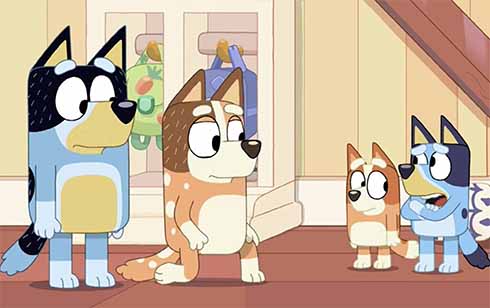 My two-and-a-half-year-old son has a set of five toy dinosaurs. They are his favourite toys. He’s named them after the main characters in a book series he loves – Roar (Tyrannosaurus Rex), Munch (Diplodocus), Stomp (Triceratops), Bash (Stegosaurus) and Boo (Deinonychus).
My two-and-a-half-year-old son has a set of five toy dinosaurs. They are his favourite toys. He’s named them after the main characters in a book series he loves – Roar (Tyrannosaurus Rex), Munch (Diplodocus), Stomp (Triceratops), Bash (Stegosaurus) and Boo (Deinonychus).
Every morning he wakes up and the dinosaurs are gone from where he left them the previous day. And so the search begins. One day they might be found sitting in the bathtub, another day they’re reading a book, another morning they’re staring at footprints on an Etch-a-sketch, or perched on top of the highest shelves in the house.
‘How did they get there?’ we ask when we finally locate them.
My son, for his part, never needs an explanation. ‘Cheeky dinosaurs’, he’ll say, before running off to play again.
Magic, we’ve discovered in our first years of parenting, is an important part of raising children. It’s a lesson we’ve learned, at least in part, thanks to Bluey on ABC.
For those of you who haven’t yet encountered this little blue dog and her family, Bluey is the star of one of the ABC’s most popular Australian kids series. The show centres around a family of four anthropomorphic blue heelers. The episodes are short – just seven minutes long – and each follows an adventure in the lives of Mum, Dad, Bluey and her sister, Bingo.
FOCUS ON THE IMAGINATION
A large part of what makes the show special is its focus on the imagination and play. Most of the adventures are set around the family home (a particularly relevant aspect of the show in a time of COVID-19), and involve parents and children playing a game together.
In one episode, a magic xylophone causes people to freeze where they’re standing when they hear it. In another one, an asparagus causes people to become whatever animal the person wielding the asparagus calls them. In another one, a feather wand causes any object it touches to become incredibly heavy. Chaos inevitably ensues – often along with some embarrassment.
Is this magic at work, or just a family using their imagination together? It doesn’t actually matter – in the world of Bluey, they’re the same thing.
The real lesson of Bluey, isn’t that magic is possible. To paraphrase G K Chesterton, every child knows that magic exists. What the show does is show how magic can shed new light on our world, our relationships, our patterns of behaviour, and lead us into new experiences.
The games the family plays often bring new things to light – it could be one child’s tendency to dominate the other, or kids feeling as though they’re being ignored by their parents. Sometimes they explore bigger ideas, such as why we get sick, or why we have rules, or how we learn new things. Occasionally, they even help kids grapple with the bigger mysteries of the universe.
WORLD OF WISDOM
While all of us are growing tired of quarantine and social distancing, Bluey shows us that there’s a whole world of wisdom to be discovered in the confines of our family home. We don’t need to travel to discover a new world and new way of living – all we need is a xylophone, a stick of asparagus or a feather.
Indeed, in a time when we’re cut off from our places of worship, it reminds us that the family home can be a sacred and mystical space, too.
Our family rituals and prayers might seem humble compared to Sunday Mass, yet it’s here that my children will first encounter the mysterious and wonderful idea of a loving God. It’s exciting for my wife and I to think about how we can introduce our children to that idea, and how we can engage their imagination and creativity in exploring it. That may, or may not, involve using a cardboard box to create and stage a Nativity Play this Christmas.
Maybe we’ll get some new ideas when we sit down to watch the new episodes of Bluey on ABC iView. The dinosaurs will be watching with us, too, presuming we can find where the cheeky things are hiding beforehand.